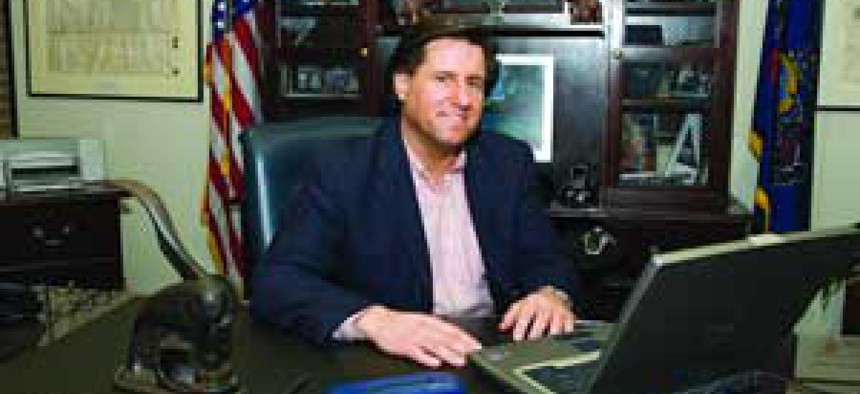Please sign on the digital line

In the latest sign that the public sector hasn't exhausted all the possibilities of e-government, Pennsylvania recently began the nation's first state-sanctioned program to let notaries digitally sign electronic documents.

I've been interested in applying technology to government since I stepped into government nine years ago. But there was a hurdle in changing notary laws so they could sign electronically. ' Steve McDonald, Lancaster County, Pa.
Barbara Kyne
As you might expect, the initiative has had as much to do with policy as it has with technology, but officials are optimistic that e-notarization will be a change for the better'and something that can enable more secure transaction across state lines.
'Once it is fully enabled for every kind of transaction, it will spur a huge amount of e-commerce,' said Steve McDonald, the Lancaster County recorder.
The Pennsylvania program is limited in its first phase to real-estate transactions in Chester, Lancaster, Philadelphia and Westmoreland counties, but McDonald said it would probably expand to the rest of the state after the first year.
Even so, change may not come quickly. State and local officials worked for four years with the help of the National Notary Association to overcome legal and technical hurdles. NNA maintains the registry for the program, which was announced in February.
'We don't have any illusions that this is going to change notarization overnight,' said Richard Hansberger, NNA's director of e-notarization.
But Hansberger hopes that e-notarization will eventually lead to more secure, standards-based seals that are readily accepted across state boundaries, unlike present paper-based systems.
'It is absolutely more secure, but there is more work ahead,' before electronic seals are universally recognized, he said.
Notaries are state-appointed officials who administer oaths and witness legal documents. They typically authenticate the identity of signers, witness their signatures and verify that documents being signed are complete.
Applying technology
Laws governing notaries vary from state to state. Some require an embossed seal and some require an inked stamp that will show up more clearly on a copy. But all are focused on paper-based transactions.
'I've been interested in applying technology to government since I stepped into government nine years ago,' McDonald said. 'But there was a hurdle in changing notary laws so they could sign electronically, like everyone else.'
Notaries were excluded from Pennsylvania's Uniform Electronic Transactions Act of 1999 and the state continued to require that a physical seal be affixed to a notarized document.
Efforts to change the law began about four years ago, and that proved to be more difficult than the technology part, said Philadelphia records commissioner Joan Decker.
'Pennsylvania wanted to retain the notary tradition, making sure it worked as it had in the past,' Decker said.
The technology, on the other hand, is based on established industry standards for public-key infrastructures, digital certificates and digital signatures.
Once state and local laws were changed, local officials worked with the Pennsylvania State Department, which oversees notaries, and NNA to come up with a scheme for implementing electronic seals.
'We worked for a year-and-a-half with officials and the business community to determine how this should be done,' Hansberger said.
The basic requirements for the program were that:
- The e-notary seals must be issued by a qualified certificate authority with the ability to suspend and revoke the seals.
- Notaries would have to appear in person before a county official to prove identity.
- Recorders in participating counties would monitor the program for one year.
The solution Pennsylvania chose is an electronic notary seal based on a standard X.509 digital certificate. The program uses True Credentials certificates from GeoTrust Inc. of Needham, Mass.
Applicable to any state
'In the end, all it is is a certificate with a format standardized for notaries that could be used in any state,' said Geo-Trust CEO Neal Creighton. Still, it is a significant development, he said.
Many of the millions of digital certificates now in use have been issued to devices. Most certificates issued to individuals are used in business-to-business applications.
'I think the business market will be the biggest for a while,' Creighton said. Although the consumer market for certificates eventually will be the largest market, it will be the last to evolve.
Targeting businesses
The Pennsylvania program initially is targeted at the business world, with the early adopters being banks, title companies and real-estate law firms with in-house notaries.
Participating notaries download a software certificate that resides on a browser rather than using a token that could be used with multiple computers.
'Eventually, we'd like to see any notary on the street be able to do this on anybody's system, but there is a lot of work to be done,' Hansberger said. 'We decided not to get into that kind of business process at this time.'
Although Pennsylvania is the first state to put in place a program for using e-notary seals, four other states'Colorado, Michigan, Texas and Utah'have authorized the sale of the electronic seals.
About 100 of the certificates were issued in the first six weeks of the program in Pennsylvania.
Typically, they're being used at mortgage closings, where the buyer and seller work on a PC rather than being confronted by hundreds of pages of documents that must be signed and initialed. The buyer and seller do not need certificates. They sign digital documents with a device that captures a digitized signature, and the notary then digitally signs the completed documents.
The notary's certificate is verified for each signing. The final documents then are encrypted and transmitted to the recorder's office for filing.
The ability to revoke a digital certificate is a major advantage of e-notarization, officials said. States can now revoke a notary's license, but 'in the paper world it means nothing,' Hansberger said.
Bogus notary seals are hot underground items for use in fraud, and it's often difficult to authenticate the seal on a paper document, especially if it comes from another state.
'This system lets the state log in and revoke the certificate,' Hansberger said. 'It's light years beyond where we're at' in the paper world.
NEXT STORY: Oregon city selects vendor for mesh network





